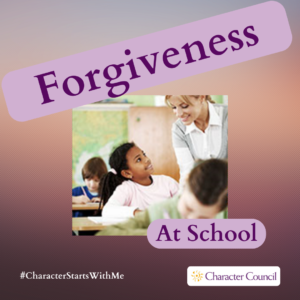
Forgiveness In School
vs. bitterness
Releasing feelings of resentment
Forgiveness and Mental Health
by Sandra Szczygiel, LPCC-S (Licensed Professional Clinical Counselor)
Forgiveness is essential to good mental health. All of us are hurt by someone at some point in our lives, be it physically, emotionally, or spiritually. Without forgiveness, we can be overtaken with resentment, bitterness, anger, and self-pity. Our bodies will eventually be impacted as well, even to the point of death.
There are seven basic steps to forgiveness. These include acknowledging the hurt, expressing the emotions associated with the hurt, empathizing with the offender, making the decision to forgive, learning from the hurtful experience, rebuilding trust, and moving forward after forgiving. These steps can be very challenging, and the amount of time needed to go through them is very individualized. Unfortunately, some people never make it through all the steps.
A quote attributed to Maya Angelou, who had a tremendous amount of hurt in her life, encapsulates the rewards of forgiveness: “It’s one of the greatest gifts you can give yourself, to forgive. Forgive everybody.” My favorite quote, however, is one by Dr. Steve Maraboli: “Forgiveness is a reflection of loving yourself enough to move on.”
References: Mayo Clinic.org, ; eNotAlone – Paula Thompson
The Links below will take you to Resources you can use in the classroom or in homeschool
to teach the Character Quality of Forgiveness.
Need to build community in your classroom? Try these team building activities!
Good Graffiti
Each person starts with a sheet of drawing paper and crayons, colored pencils, or markers. The object of the activity is for each person to draw graffiti. Explain that graffiti is drawn on public buildings, trains, bathroom stalls, etc. by individuals who want to...
Our other Pillars have resources that can be used in an educational setting or for education professionals.
Visit Forgiveness in Business>>
Teambuilding
Power Up with Character
Interview Questions
Adult Business Books
Visit Forgiveness in the Community>>
Quotes
Character All Month Calendar
Related Qualities
Character Holiday Activities
Family Activity (with a printable for sending home to parents)
Visit Forgiveness in Faith>>
Christian Family Activity
Bible Verses
Christian Poster
Prayer and Reflections
Archived Resources
